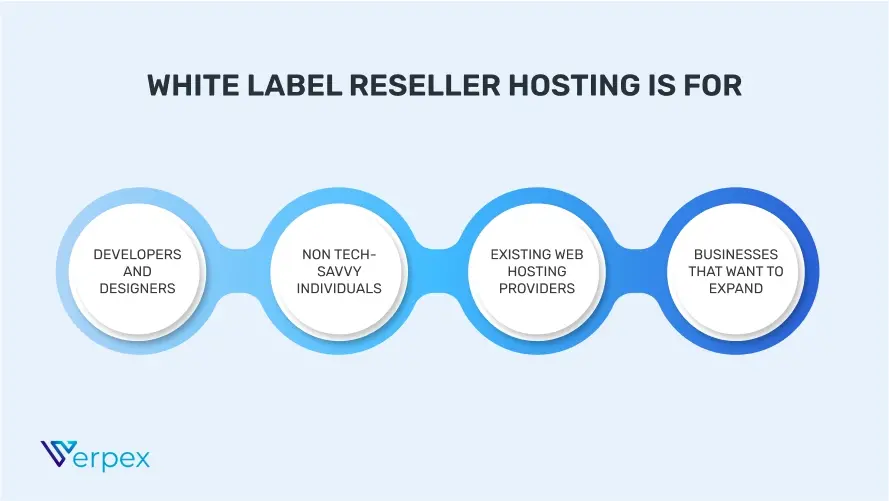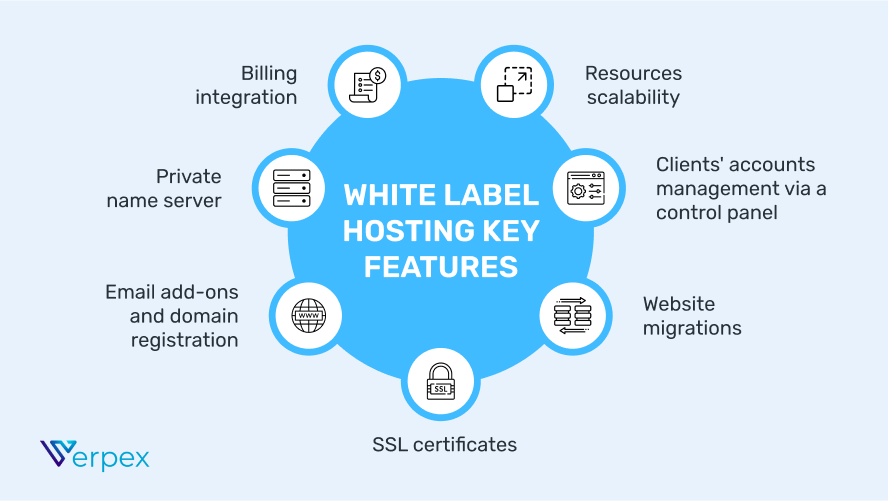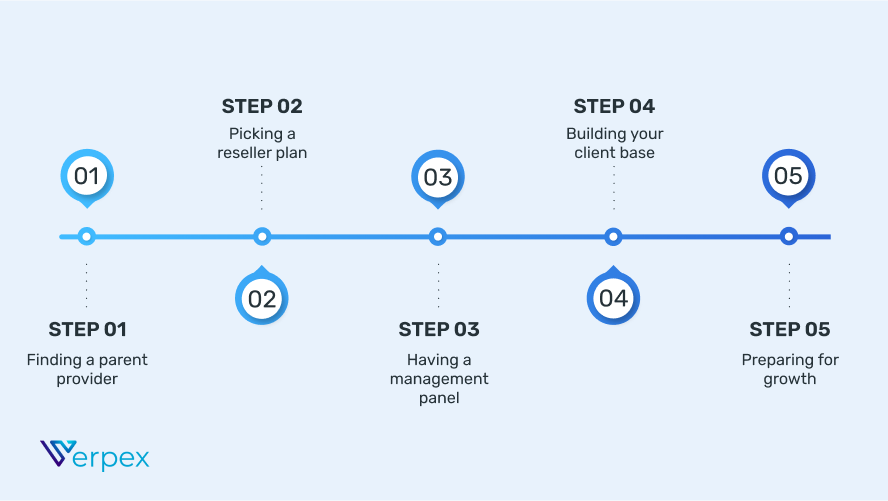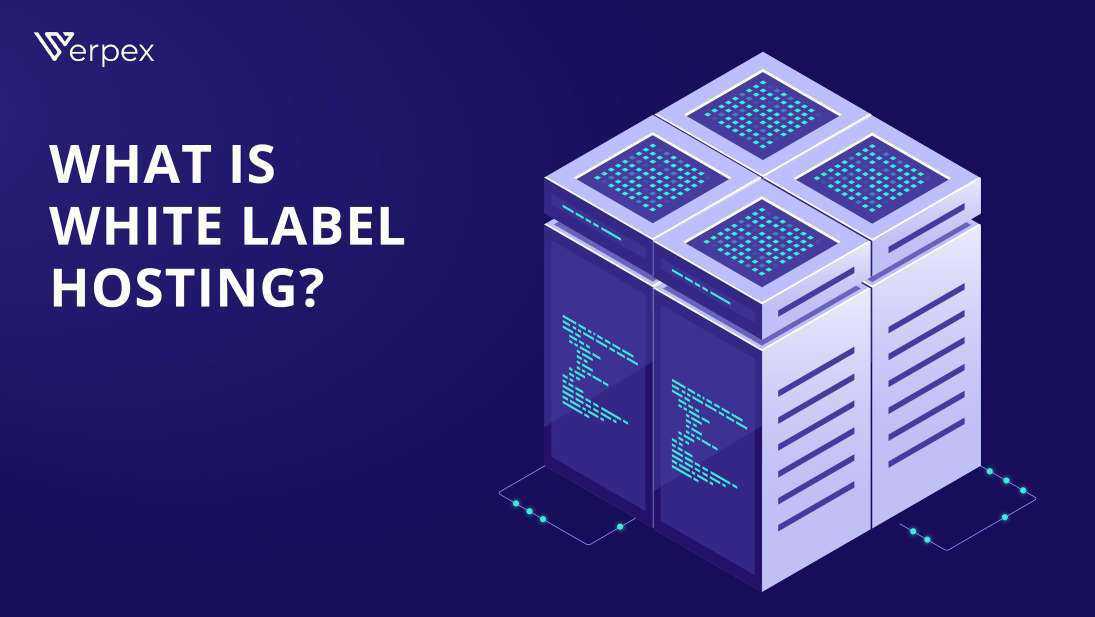The web hosting industry has become a massive place where many people have found their calling. It is home to over 126 million web hosting providers and has been estimated to have a value of over $83 billion in 2021.
A part of that industry is white label hosting. It's closely associated with reseller hosting.
Reseller hosting is when third parties buy a reseller plan from a parent web hosting provider, and that plan enables them to sell the resources they get as their own.
When combined with white label hosting, or what is known as white label reseller hosting, it becomes a cost-effective way for small businesses to enter the web hosting market and start their own web hosting business.
So, in this article, we will explore what you need to do and what you need to know in order to resell hosting and get your business off the ground.
What Is White Label Reseller Hosting?
White label reseller hosting is a business model that includes re-selling the resources of a larger hosting provider as your own to your customers under your own brand.
This includes finding a parent provider to buy the resources from and selling their servers, bandwidth, RAM, etc., without taking care of the technical requirements and server management and maintenance by yourself.
Basically, it allows you to have your own web hosting business without all the challenging technical parts. And since it's become a popular choice among users, many providers have their own reseller plans. One such provider is Verpex, and you can check out our best reseller hosting plans if you're interested.
How Does White Label Work?
If you want to participate in the white label web hosting business and have a reseller hosting website, you first need to find a parent provider and purchase a reseller plan in order to obtain web hosting services. After you've decided on a parent provider, you can start your hosting business.
The goal of white label web hosting is to charge your customers a higher price compared to the one you paid to your parent provider for purchasing the reseller plan and obtaining the necessary resources. This saves you all the time and money you'd otherwise have to spend on setting up servers and other resources yourself.
So, how does reseller hosting work? Well, it essentially allows you to skip this and start your business right away because, essentially, you're re-selling finished products.
Who Should Opt for White Label Reseller Hosting?

1. Developers and designers
White label reseller hosting can be an excellent addition to the services of web developers and web designers who want to host their customers' sites on separate control panel accounts
2. Non tech-savvy individuals
White label reseller hosting can become a business or source of income for anyone who wants to sell hosting services without caring about the technical requirements. It makes the web hosting industry more available to individuals that want to be a part of it but lack the technical knowledge, money, or time to set up and manage servers and other resources
3. Existing web hosting providers
Having white label hosting or reseller hosting as part of your overall hosting business is a great way to expand your business and offer a broader range of services
4. Businesses that want to expand
Any business that has an online presence can use white label reseller hosting as a means of offering more services to their customers, thus providing them with a solution to more issues all in one place
White Label Hosting vs. Traditional Reseller Hosting
Comparing Business Models
While both white label hosting and traditional reseller hosting involve selling web hosting services to clients, they differ in several key aspects. Understanding their similarities and differences can help you choose the right approach for your hosting venture.
Similarities:
- Both models allow you to resell hosting services from a primary provider.
- They enable you to create your own hosting packages and pricing structures.
- Both types of hosting businesses require you to market your services and provide customer support.
Differences:
- White label hosting allows you to sell hosting services under your own brand name, while traditional reseller hosting may require you to operate under the primary provider's brand.
- White label hosting typically offers a higher degree of customization and control over the services you provide, allowing you to tailor the features and user experience to your specific target audience.
- Traditional reseller hosting often involves a more hands-on approach to server management and technical aspects, while white label hosting usually offers more streamlined solutions and support from the primary provider.
White Label Hosting Key Features
The complete list of services you will get depends on the parent provider you choose. But let's go over some of the features that most white label web hosting providers offer in their reseller hosting plans:

Billing integration
WHM billing software is included in most reseller plans, allowing you to easily bill your clients and manage their payment plans. This relieves you of the burden of ensuring that your clients pay you on time.
Resources scalability
Reseller hosting enables you to scale up your hosting resources as soon as the need arises as you grow your customer base.
Private name server
Allow you to separate your brand from the brand of your parent provider and are vital for rebranding the services you sell as your own.
Clients' accounts management via a control panel
It's essential to have a user-friendly control panel that is easy to use so that website management, making backend changes, and granting access to customers are more straightforward.
Email add-ons and domain registration
Many providers make re-selling domain names and email add-ons available in their reseller plans because this makes them more appealing to potential white label reseller hosting users. Also, many offer domain registration and domain transfer for free.
Website migrations
Most providers offer free website migrations in their reseller hosting plans so that users can migrate their existing websites to the provider
SSL certificates
Free SSL certificates are included in most reseller hosting plans, and the parent providers usually take care of the installation and renewal for you and all of your customers
Legal and Regulatory Considerations for White Label Hosting
Navigating Compliance and Protecting Your Business
Operating a white label hosting business comes with its own set of legal and regulatory considerations.
Ensuring compliance with applicable laws and regulations is crucial to maintaining the trust of your customers and avoiding potential legal issues.
Understanding these requirements and implementing proper policies and procedures can help protect both your business and customers.
1. Business Registration and Licensing: Depending on your jurisdiction, you may need to register your white label hosting business as a legal entity and obtain the necessary licenses or permits. Consult with a legal expert or your local government office to determine the specific requirements for your region.
2. Data Privacy and Security: As a hosting provider, you will be responsible for safeguarding your customers' data. Familiarize yourself with data protection regulations, such as the General Data Protection Regulation (GDPR) or the California Consumer Privacy Act (CCPA), and ensure your business complies with these standards. Implement strong security measures and maintain a privacy policy that outlines how you handle and protect customer information.
3. Copyright and Intellectual Property: It is essential to respect the intellectual property rights of others when operating a hosting business. Ensure that you have the necessary permissions to use any copyrighted material, such as software, images, or logos, and implement a clear policy to handle copyright infringement claims from your clients or third parties.
4. Service Level Agreements (SLAs) and Terms of Service (ToS): Draft clear and comprehensive SLAs and ToS documents that outline the terms and conditions of your hosting services. These documents should detail the rights and responsibilities of both your business and your customers, including service availability, performance guarantees, billing policies, and dispute resolution processes.
5. Liability and Indemnification: Consider obtaining liability insurance to protect your business from potential claims related to your hosting services. Include indemnification clauses in your contracts to limit your liability for any damages or losses that may arise from the use of your services.
6. Tax Compliance: Understand and adhere to the tax laws and regulations applicable to your white label hosting business. This may include collecting sales tax or value-added tax (VAT) on your services and filing appropriate tax returns.
What Are White Label Reseller Hosting Main Benefits?
Pros
Cons
Pros of White Label Reseller Hosting
- Source of income
Offering best reseller hosting to customers and charging them a monthly fee or subscription makes for a stable source of revenue that can cover the investments and costs you've made and will make in the business. Also, you can start earning a hefty amount of profits after you've amassed a significant client base.
- Relatively small start-up investment
White label reseller hosting enables you to cut your costs because you don't need to invest a large amount of money in starting your business as you get your resources from another provider. You will need to invest in a reseller plan, a website, etc., but those costs are pretty minor compared to a having full-blown web hosting company with your own servers.
- Opportunity to grow and scale your own brand
By selling a wide range of services to different groups of customers, you grow the reach of your brand by appealing to a broader pool of customers .
- Extra services for your existing clients
By offering solutions to more problems all in one place, you make sure that the customers' needs are satisfied and that they can rely on for more than what they've signed up for. In turn, you can charge premium prices for different bundles of services, which will increase your income.
Building a recurrent revenue stream
The more you grow and invest in your web hosting business, the more stable the business becomes with customers that continuously use your services. This ensures that you have a recurrent revenue stream you can rely on.Support from your parent reseller hosting provider
With white label hosting, the parent provider assists you in resolving server issues, addressing customer concerns and difficulties, and providing you with business insights and knowledge. All of these characteristics help you to expand your business while keeping your hosting services running properly.
- No need to maintain your own physical servers
This is in the hands of the parent provider, which allows you to focus on your business and customers. So even if you don't have the technical knowledge to maintain and manage servers, you can still have your own web hosting business.
- Huge and constantly growing demand for web hosting services
The web hosting industry is estimated to have a $183 billion value in 2027. Also, the eCommerce industry is becoming more and more prominent, estimated to be worth over $7 trillion by 2025. So, web hosting services will only grow in demand as more and more websites will be created by individuals looking to enter the eCommerce market.
- Flexibility: Your brand - Your rules
With white label reseller hosting, you are in charge of what you do, how you want to present yourself, who you want as a customer, etc. You don't have to follow any guidelines or rules of other providers or other people in general, which allows you to create the brand you want.
- Lower space requirements
With white label reseller hosting, you use the servers of your parent provider. This means that you don't need any servers of your own, which enables you to run your business from your home or save on rent by renting a smaller office space.
- Better customer retention
By offering customers solutions to more problems all in one place, you ensure that they pick you as a business partner in the future and for other services they might need. This produces loyal customers that will make you long-term profits. And seeing as 65% of a company's business comes from existing customers, it significantly helps your business grow and expand.
Cons of White Label Reseller Hosting
- It's not a passive income
You do need to invest time in it, especially at the very beginning.
- Numerous competitors
Great margins, small investments, and not too much technical knowledge required to have a web hosting business contribute to bringing many players to the market, which makes the whole niche highly competitive.
- It's time-consuming
You need to make sure not to abandon your primary online business or switch to your web hosting business full-time if you don't have time for both. Having a successful web hosting business is time-consuming, just like any other business.
- Have to provide customer support to your end clients
Your reseller hosting provider takes care of your own issues, but you have to assist your own customers.
How to Start a White Label Web Hosting Business?

There are five steps that are essential for starting a white label web hosting business:
Finding a parent provider - Research the market and consider things like prices, customer support, reviews, security features, etc.
Picking a reseller plan – You need to figure out what you need and choose your plan accordingly.
Having a management panel – Make sure to get a plan that offers an intuitive management panel with a dashboard that is easy to navigate, like the WHMCS.
Building your client base – You can use many different tactics for this, like social media marketing, placing ads on Google and Facebook, etc.
Preparing for growth – Reseller plans allow you to scale up your resources to accommodate your growth needs on time.
Integrating Third-Party Tools and Services
Enhancing Your White Label Hosting Offerings
Incorporating third-party tools and services into your white label hosting packages can significantly enhance the value you provide to your clients.
By offering a range of solutions that cater to their specific needs, you can create more attractive and comprehensive hosting packages that set you apart from competitors. Examples of popular tools and services that can be integrated into your white label hosting business include:
1. Website builders: Offering an easy-to-use website builder as part of your hosting packages can help clients create professional websites quickly and effortlessly, without needing advanced technical skills.
2. Content Management Systems (CMS): Integrating popular CMS platforms like WordPress, Joomla, and Drupal allows your clients to manage their website content more efficiently.
3. Ecommerce solutions: By offering specialized eCommerce hosting plans like WooCommerce hosting or Magento hosting, you can help clients set up and manage their online stores with ease.
4. SEO and marketing tools: Providing access to SEO tools like Yoast, SEMrush, or Ahrefs can help your clients optimize their websites for search engines and improve their online visibility.
5. Security and backup services: Integrating security tools like SSL certificates, malware scanners, and automated backups can help protect your clients' websites and ensure the safety of their data.
6. Email and collaboration tools: Offering professional email services, along with collaboration tools like Office 365 or G Suite, can help your clients communicate and collaborate more effectively.
7. Analytics and performance monitoring: Integrating analytics tools like Google Analytics or performance monitoring solutions like New Relic can provide your clients with valuable insights into their website's performance and user behavior.
8. Domain registration and management: By partnering with domain registrars, you can offer your clients an all-in-one solution for domain registration, renewal, and management.
Evaluating Your White Label Hosting Business
Monitoring KPIs and Leveraging Data for Continuous Improvement
To effectively evaluate and optimize your white label hosting business, it's essential to monitor key performance indicators (KPIs) and use data analysis for continuous improvement.
This approach allows you to identify opportunities for growth, make informed decisions, and ensure the long-term success of your business. Consider monitoring the following KPIs for your white label hosting business:
Customer Acquisition Cost (CAC): Assess the average expense involved in acquiring a new customer, taking into account marketing and advertising costs. A more efficient customer acquisition strategy will result in a lower CAC.
Monthly Recurring Revenue (MRR): Keep track of the recurring revenue generated by your hosting services on a monthly basis. A steadily increasing MRR signals positive business growth and stability.
Churn Rate: Gauge the percentage of customers who terminate their hosting services within a specific timeframe. A minimal churn rate is indicative of high customer satisfaction and loyalty.
Customer Lifetime Value (CLV): Estimate the total revenue that a customer contributes during their relationship with your business. A higher CLV implies satisfied customers who are likely to remain loyal over time.
Average Revenue Per User (ARPU): Calculate the average revenue generated per customer. Enhancing your ARPU allows you to boost overall revenue without necessarily acquiring new customers.
Net Promoter Score (NPS): Measure customer satisfaction and loyalty by inquiring about the likelihood of customers recommending your services to others. A strong NPS reflects an excellent brand reputation and high customer satisfaction.
Server Uptime and Performance: Keep an eye on the performance and uptime of your hosting servers. Ensuring high uptime and optimal performance contributes to customer satisfaction and reduces the chances of churn.
Support Ticket Volume and Resolution Time: Track the number of support tickets submitted by customers and the average duration required to resolve them. Fewer tickets and quicker resolution times suggest efficient customer support processes and increased customer satisfaction.
Tips for Success in White Label Hosting
Tips for success in white label hosting are essential to consider as you build and grow your business. One key aspect is keeping up with industry trends by staying informed about the latest advancements in web hosting technology and services, monitoring competitors' offerings, adapting to emerging customer needs, and attending conferences or webinars to expand your knowledge and network. Providing exceptional customer support is another vital factor, which includes:
- Prioritizing responsive and helpful customer service
- Offering multiple support channels, such as live chat, email, and phone
- Training your support staff to handle common issues effectively
- Establishing a knowledge base or FAQ section on your website
What Are the Common Challenges of Running a White Label Reseller Hosting Business?
Running a reseller hosting company can be tremendously lucrative, but it also presents a special set of difficulties. As a reseller, you are responsible for managing the hosting of other websites, which calls for a high level of technical knowledge and commitment. Here are 4 of the most typical difficulties faced when operating a reseller hosting company.
1. Finding the ideal hosting provider is one of the most difficult aspects of starting a reseller hosting business. The tools you can use as well as how you do business will be influenced by your hosting provider. It's critical that you choose a hosting company with a solid reputation in the neighborhood and one you can rely on.
2. Providing client service around-the-clock is another difficulty. Make sure you have the required support staff or processes in place if you want to keep up with client enquiries and problems. Moreover, make certain that the hosting company you select includes 24/7 support in its service offering.
3. Developing a powerful marketing strategy. Creating a reseller hosting website, using search or display ads, or developing an organic content marketing strategy are all ways to efficiently market your reseller hosting company.
4. Finally, you must ensure that your hosting packages are excellent. Make certain that your packages come with extras like a free SSL certificate and domain registration. Also, you should make sure that your packages may be customized and are competitively priced.
Although operating a reseller hosting company might be a terrific method to create a second source of income, it has its own distinct set of difficulties. In order to succeed, you must ensure that you have the resources and equipment required. This entails selecting the best hosting company, offering customer service around-the-clock, and developing an effective marketing plan. Also, you must make sure that your hosting packages are excellent, have extra features, and are priced affordably. You may overcome these difficulties and run a
Is White Label the Same as Private Label?

These two concepts have their similarities but are essentially two different things.
A white label is when a manufacturer creates a generic white label product for numerous resellers. Each retailer can label the product as their own, but it's still the same product being sold by all these retailers.
However, with private labeling, the product is designed for a single reseller's exclusive sale. The private label retailer can customize the product to match their specific selling needs, strategies, and brand. Unlike generic white label products, the modified private label product is distinctive to that particular retailer. It can even be customized with the retailer's logo or branding colors, differentiating it from the products that competitors sell.
The Bottom Line
White label reseller hosting is an excellent way to enter the web hosting market and start your own web hosting business without the need for advanced technical knowledge and spending a lot of money on resources.
Also, it is a great way to have a profitable business, and it allows you to create your own brand based on your preferences. Of course, it takes time and effort to build a successful web hosting business, but it's worth it in the long term because this industry and the need for web hosting continues to grow.
Frequently Asked Questions
What is reseller hosting?
Reseller hosting is essentially a way for you to purchase hosting resources from us in bulk and then to re-sell those resources directly to your clients. You can set limitations on disk space, bandwidth, email usage, and other features on a per-package or per-site basis. We provide a completely managed service from a technical perspective - the server space, hosting resources and support come from us and you are responsible for supporting your end-user clients. You can even brand your clients' cPanels with your own logo for a super professional image.
But reseller hosting isn’t just for web designers, agencies and start-up hosting companies - it’s also a great option if you run a lot of websites personally. Because you have access to WHM, you can create each site with its own separate cPanel. This means each site or client gets their own login to manage their own hosting settings, isolating them completely from other users on the same server or under your account. This improves site performance and resiliency from malware attacks.
We have a lot more information on what is reseller hosting on our blog.
Can you make money with reseller hosting?
You definitely can. There are countless success stories from entrepreneurs that have managed to take on hundreds, even thousands of clients, just be aware of the work you’ll need to put in.
Read our article to learn more about web hosting business income.
How does Verpex help with my reseller hosting?
Our job doesn’t end once we’ve sold you the reseller space. In fact, we’re with you for the whole time you’re hosting with us, supporting both your needs and that of the customers you pick up along the way, whether you max out your cPanel account limit or not.
The Verpex team is at your disposal, acting as your essential support team 24/7. That means anything pertaining to hardware, the network, updates and configuration, security, and connectivity, is all handled by us.
Both you and your customers can focus on running your businesses while we take care of all maintenance and troubleshooting with expert technical support.
Are all reseller hosting plans cloud-based?
Our servers are in the cloud. So yes, all our reseller hosting plans are cloud-based
What restrictions are there to reselling?
There are no restrictions to reselling, except for contents that are illegal or against our terms of service
What’s included in a reseller package?
Reseller packages commonly include disk space, domain hosting, bandwidth, the latest cPanel control panel, premium support by the hosting providers, the ability to brand your own web hosting company, and so on.
Is reseller hosting profitable?
In general, reseller hosting is very profitable. However, to be able to offset your initial cost, the hardest part will be getting your first few reseller clients.
Affiliate program vs reseller hosting: What is the difference? Which is better?
Both have advantages and disadvantages and one isn’t better than the other. Rather, each will be better in different circumstances.
Those looking to build a business should try reselling, while those wanting passive income should become affiliates.
You can learn more about the differences between reseller hosting and affiliate programs on our blog.
How is the website maintenance carried out?
On a daily basis, software, hardware, vulnerability, MariaDB, CloudLinux paths and cPanel updates are carried out on our servers without a reboot. However, if we have to carry out any maintenance that includes some downtime, we schedule in advance and update our status page
How can I create custom plans for each individual account?
You can get the step-by-step procedure to create custom plans for an individual account in this guide
Will you be able to fully restore the website if something goes wrong?
Should anything happen, your website can be restored fully with the help of JetBackup5
How long do you retain Backups?
Backups are kept for 30 days
Do you include litespeed and lscache?
We run on Litespeed servers which allows you to run the LSCache WordPress plugin

I've been navigating the web hosting waters for years now. As the Chief Editor at Verpex, I team up with some awesome writers to dish out the good stuff on hosting. Got a Master's in Journalism, so I always have an eye out for quality. Whether you're just dipping your toes or you're a seasoned surfer, I'm here to make everything web hosting feel like a breeze
View all posts by Julia Lozanov




















